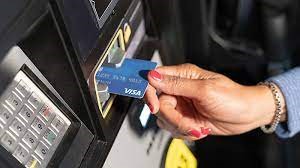
I. CEO Message
II. HR Comments
III. Industry Update
IV. Electric Vehicle Update
V. Employee Spotlights
VI. First Aid Safety Moment
VII. Construction Corner
VIII. Mountain West Update
IX. Customer Spotlight
Industry Update – Bill Reichold
Since I’ve been talking about the price of gas for the last few newsletters I thought, “why not keep it going”!
There is a big fight within in the industry going on between the people that sell gas and the credit card companies regarding the costs of using a credit card at the pump. So why should you care about this? Because these costs, called “interchange fees” are passed on to you. In short, interchange fees (also known as swipe fees), are the 2%–3% that credit card companies charge retailers every time a customer swipes their credit card to make a purchase. Visa and Mastercard set the swipe fees for the thousands of banks that issue their cards—and consumers foot the bill.
In the 1983 movie National Lampoon’s Vacation, Clark Griswold takes the ‘Family Truckster’ to the only auto repair shop in town for emergency repairs after an offroad misadventure. He asks the mechanic, “What’s the bill?” The mechanic replies, menacingly, “How much you got?”

That scene pretty much describes the current credit card market. There is no competition, so there is no reason to compete on price. You pay what Visa and Mastercard say you will pay—and they are fighting to keep it that way.
Now you may be asking, “How is this possible? Haven’t massive advances in technology greatly enhanced efficiencies and led to reduced costs?” Of course they have, but when there is no competition there is no need to use prices to attract customers. Instead, the fees just increase.
Support is growing to change this broken system and introduce competition. In July, the U.S. Senate introduced legislation to address credit card swipe fees. The Credit Card Competition Act of 2022 seeks to enhance competition and choice in the credit card network market, which is currently dominated by the Visa-Mastercard duopoly that controls about 84% of the nearly $5 billion credit card business. In short, it would require banks to put a second network on a credit card, meaning it can’t be just Visa or just Mastercard. When a credit card is used to pay at a convenience store, the retailer would get to choose which network to route that transaction through. The networks will compete for the retailer’s business, and as any retailer can attest, competition is always good for the consumer because it drives prices down.
Swipe fees are clearly a problem. They cost the convenience store industry $37 million—a day. You can help by contacting your local Senator to support the swipe fee bill. After all, if one guy with a wrench could fix that battered Family Truckster, imagine what we could do if we worked together to fix the broken swipe fee system.
Content from Jeff Lenard of the National Association of Convenience Stores (NACS).
